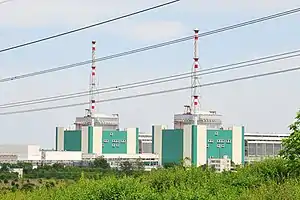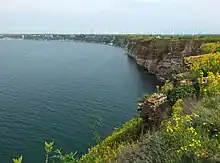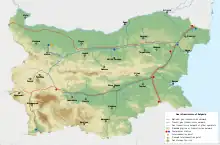Energy in Bulgaria
Energy in Bulgaria is among the most important sectors of the national economy[1] and encompasses energy and electricity production, consumption and transportation in Bulgaria.[1] The national energy policy is implemented by the National Assembly and the Government of Bulgaria, conducted by the Ministry of Energy and regulated by the Energy and Water Regulatory Commission.[2] The state-owned company Bulgarian Energy Holding owns subsidiaries operating in different energy sectors, including electricity: Kozloduy Nuclear Power Plant, Maritsa Iztok 2 Thermal Power Plant, NEK EAD and Elektroenergien sistemen operator (ESO); natural gas: Bulgargaz and Bulgartransgaz; coal mining: Maritsa Iztok Mines. The state holds a 100% stake in the holding company.[2][3][4] In Bulgaria, energy prices for households are state-controlled, while commercial electricity prices are determined by the market.[5]

Total energy production was 10.832 million tonnes of oil equivalent in 2020, of which 23.3% was produced from renewable sources.[6] Energy dependence on foreign imports as of 2020 was at 37.9%, lower than the European Union average of 57.5%.[6]
Bulgaria’s power sector is diverse and well developed, with universal access to the grid and numerous cross-border connections in neighbouring countries.[7] Although almost totally dependent of imported crude oil and natural gas, Bulgaria has an energy surplus and is a net exporter of electricity.[7] Total electricity production in 2022 has reached 49.4 TWh, while demand was 37.8 TWh.[2][8] Per capita production as of 2022 was 7,458 kWh, the highest in Southeastern Europe.[9] The main sources of electricity generation were fossil fuels (52%) and nuclear power (33%).[2] Bulgaria has a national target of at least 27.09% renewable by 2030.[10]
Energy sources
Natural gas
Bulgaria is believed to have extensive natural gas resources[11] but, due to a successful campaign against hydraulic fracturing on land, only Black Sea exploration is permitted, such as at the Galata gas field.[12][13][14] On 8 July 2023, the petrochemical companies OMV and Total announced that after a study of natural gas deposits in the Bulgarian exclusive economic zone in the Black Sea, it was estimated that up to 13 billion cubic meters of natural gas could potentially be extracted.[15] As of 2022, domestic production of natural gas remains insignificant, at 17 million cubic meters.[2] The main consumers are the energy and the chemical sectors, which combined account for 54% of the consumption.[2]
Bulgaria consumes about 3 billion cubic meters (bcm) of natural gas.[16] The Gas Interconnector Greece-Bulgaria natural gas pipeline became operational in 2022, and Bulgaria receives about 1 bcm a year from Azerbaijan.[16][17] The country imported over 90% of its natural gas from Russia via the Turk Stream pipeline under a 10-year contract,[18] which expired at the end of 2022.[16] Due to the 2022 Russian invasion of Ukraine, on 16 March 2020 Bulgaria's deputy prime minister Asen Vasilev announced that the country would not hold talks to renew the contract.[16] In April 2022, it was announced that Russia will suspend sending gas supplies to Bulgaria and Poland, due to their refusal to pay in roubles. In response to this, Bulgaria shifted to imports of liquefied natural gas.[19]
Oil
Most oil products are consumed by transport.[20] Lukoil Neftohim Burgas, the biggest oil refinery on the Balkans, refines the predominant amount of the crude oil that eventually reaches the Bulgarian market as refined petroleum. The refinery is owned by the Russian multinational energy corporation Lukoil.[21]
Bulgaria received an exemption from the EU to continue importing oil from Russia, by ship, until December 2024.[22] Part of the terms of the exemption, was that from January 2023 Lukoil will pay taxes in Bulgaria, which it had until 2022 avoided, by paying profits to Switzerland and The Netherlands, Bulgaria believes it will receive €350m in taxes per year.[22]
In October 2023 Bulgaria noted Lukoil had found interest from potential buyers for the refinery and that the current 60% tax on revenue would fall to 15% for a new owner, with Russian oil ceasing to be processed after 1 October 2024.[23]
Coal
Coal extraction remains important for Bulgaria's energy sector.[24] Bulgaria possesses significant reserves of coal estimated at 4.8 billion tons.[25] More than 92% of them, or 4.5 billion tons,[25] is lignite, which is the lowest rank of coal due to its relatively low heat content but is widely used for electricity generation. With reserves of 2.856 billion tons Maritsa Iztok, situated in the Upper Thracian Plain, is by far the largest coal basin in the country which powers Maritsa Iztok Complex, the largest energy complex in South-Eastern Europe.[26] Other lignite basins include Sofia Valley (reserves of 870 million tons), Elhovo (656 million tons), Lom (277 million tons), Maritsa Zapad (170 million tons).[26] The reserves of sub-bituminous coal are 300 million tons, situated mainly near Bobov Dol, Pernik and Burgas.[27] The recoverable reserves of bituminous coal and anthracite are insignificant – 10 and 2.5 million tons respectively. However, there is a huge basin of bituminous coal in Southern Dobruja with estimated reserves of over 1 billion tons but its large depth (1370–1950 m) is an obstacle for its commercial exploitation.[28]
As of 2022, coal production was 36 million tons, of them 98% were lignite and 2% sub-bituminous coal. The mines of Maritsa Iztok accounted for 98.6% of the lignite etraction. About 97% of the coal production was utilised for electrical and thermal power generation and further 2% were used for the production of briquettes.[2] Bulgaria plans to reduce coal as an energy source from 2030, with coal being discontinued in 2038.[29]
Renewable energy


| Achievement | Year | Achievement | Year | Achievement | Year |
|---|---|---|---|---|---|
| 10% | 2009 | 15% | 2012 | 20% | 2020[30] |
Renewable energy includes wind, solar, biomass and geothermal energy sources (although it is not yet known whether geothermal energy could generate any electrical power as only slightly over 100 degrees C had been found by 2023[31]).
Solar power
Bulgaria has around 1.2 GW of solar power installed. Solar farms are under construction in 2022 to increase the capacity.[32]
Wind power
In 2019 Bulgaria had 708 MW of wind power capacity, with the European Wind Energy Association stating that Bulgaria has the potential to generate up to 3.4 GW of wind power.[33]
Hydroelectric
Generating over 10% of Bulgaria's electricity, most hydro plants are located in the Rhodope Mountains.
Nuclear power
Bulgaria has two operational reactors and four that have been closed down prior to 2006. The two operational reactors have a capacity of 2 GW in total. In 2020 nuclear energy produced 16.6 TWh, which was 41% of Bulgaria's electricity generation.[34]
In 2023, US based Westinghouse Electric Company are in the planning process with Kozloduy NPP-Newbuild to build the first of four new reactors in Bulgaria.[29][35]
Heating
More than a quarter of the population are estimated to be in energy poverty, as some buildings are not well insulated.[36][37] Geothermal heating of some schools is being trialled.[38] Burning wood and coal for home heating, which is a common practice in smaller towns and municipalities, as well as some of the less affluent suburbs of major cities, is a major cause of chronic illnesses and excess deaths in the country.[39][40][41]
Energy transit

Russian gas from Turkstream transits to Serbia and Hungary.[42]
In October 2023 Bulgaria passed a law taxing Russian gas in transit to Hungary, Serbia and Bosnia and Herzegovina at 20 levs (10.22 euro) per MWh.[23] It could generate €1.2 billion in taxes p.a..
Energy Transition
In accordance with the European Union's Fit for 55 plan to reduce greenhouse gas emissions by 55% by 2030, as well as the European Green Deal, the country is in the process of becoming climate neutral by 2050 and is thus working on reducing its greenhouse gas emissions by encouraging new renewable power investments.[43] In addition, all of the currently operating coal power plants are expected to close by the end of the decade as they will become economically unprofitable, owing to the recent and future trend of decreasing renewable energy prices. In 2023 the Center for the Study of Democracy made a plan for climate neutrality. [44]
It is planned to increase Hydro energy by 870MW and solar to double by 2030. There is also a plan to build a new nuclear reactor to enable an older reactor to be closed down.
Citations
- Donchev & Karakashev 2004, p. 284
- "Bulletin on the Condition and Development of Energy in the Republic of Bulgaria in 2022" (PDF). Official Site of the Ministry of Energy of Bulgaria. Retrieved 15 October 2023.
- "Bulgaria Consolidates Five Energy Companies into Holding". Sofia News Agency. 2008-02-13. Retrieved 2008-02-24.
- "Bulgaria announces birth of energy giant with new holding company". Power Engineering. 2008-02-14. Archived from the original on 2008-10-18. Retrieved 2008-02-24.
- "Bulgaria - Country Commercial Guide".
- "Bulletin on the Condition and Development of Energy in the Republic of Bulgaria in 2021" (PDF). Official Site of the Ministry of Energy of Bulgaria. Retrieved 15 October 2023.
- "Bulgaria - Power Generation". Retrieved 15 October 2023.
- "България отчита 22% ръст на тока от въглища през 2022-а, потреблението спада (графики)". Capital. Retrieved 15 October 2023.
- "Per Capita Electricity Production". Our World in Data. Retrieved 15 October 2023.
- "Bulgaria to increase renewable energy deployment in 2023". 3 January 2023.
- Milcheva, Emiliya (2022-06-10). "Bulgaria is rich with shale gas, but lacks political will to exploit it". www.euractiv.com. Retrieved 2023-03-24.
- Tucker, Aviezer (December 19, 2012). "The New Power Map: World Politics After the Boom in Unconventional Energy". Foreign Affairs. Retrieved December 31, 2014.
The mark of outside influence is clear: In Bulgaria, there are rarely demonstrations of any kind
- Yardley, Jim; Becker, Jo (December 30, 2014). "How Putin Forged a Pipeline Deal That Derailed". The New York Times. Retrieved December 31, 2014.
Almost immediately, a well-organized campaign emerged to kill shale exploration before it began, fueled in part by loyalists for Ataka, one of the several far-right parties that Putin has cultivated in Europe.
- Esau, Iain (2023-01-06). "Could prolific Turkish gas play extend into Bulgarian waters?". Upstream Online. Retrieved 2023-03-24.
- https://euronewsbulgaria.com/news/16436/total-i-omv-prognozirali-dobiv-ot-13-mlrd-kubika-priroden-gaz-godishno-v-cherno-more
- Tsolova, Tsvetelia (19 March 2022). "Bulgaria will not hold talks to renew gas deal with Gazprom". Reuters. Retrieved 26 April 2022.
- "Bulgaria increases purchase of Azerbaijan gas". 2 July 2023.
- Tsolova, Tsvetelia (26 April 2022). "Gazprom informs Bulgaria it will halt gas supplies as of April 27". Reuters. Retrieved 26 April 2022.
- Strzelecki, Marek; Tsolova, Tsvetelia; Polityuk, Pavel (2022-04-27). "Russia halts gas supplies to Poland and Bulgaria". Reuters. Retrieved 2022-04-27.
- "Bulgaria Energy Information | Enerdata". www.enerdata.net. Retrieved 2023-01-12.
- Shikerova, Genka; Wesolowsky, Tony (2023-01-19). "Russia Gets Its Oil Into The EU Through Bulgaria. Perhaps Not For Long". Radio Free Europe/Radio Liberty. Retrieved 2023-03-24.
- "Bulgaria to let Russian oil refinery export despite EU ban". 1 November 2022.
- "Lukoil Bulgaria refinery attracts buyer interest - report". 18 October 2023.
- Donchev & Karakashev 2004, p. 286
- Donchev & Karakashev 2004, p. 42
- Donchev & Karakashev 2004, p. 43
- Donchev & Karakashev 2004, p. 44
- Donchev & Karakashev 2004, pp. 44–45
- "Bulgaria energy strategy includes four new nuclear reactors". 19 January 2023.
- "Energy consumption in Bulgaria". 2020.
- "The World Bank to help Bulgaria benefit from its geothermal resources". World Bank. Retrieved 2023-08-18.
- "Eurohold building Bulgaria's largest solar power plant". 20 December 2022.
- "The Growing Importance of Wind Power in Bulgaria". 25 June 2023.
- "Nuclear Power in Bulgaria". May 2023.
- "Bulgaria moves to install new nuclear reactor at Kozloduy plant". 19 June 2023.
- "Turning up the heat on Europe's fuel poverty crisis". euronews. 2022-01-26. Retrieved 2022-04-28.
- "Bulgaria has EUR 1.1 billion for energy renovation of residential, public buildings". Balkan Green Energy News. 2022-04-15. Retrieved 2022-04-28.
- "Bulgarian municipalities win EEA funds for geothermal heating, cooling". Balkan Green Energy News. 2022-02-09. Retrieved 2022-04-28.
- "Health Fears Mount Over Central Europe's 'Burn Everything' Heating Efforts". RadioFreeEurope/RadioLiberty. 9 December 2022. Retrieved 2023-01-12.
- "The energy sector in Bulgaria". Bankwatch. Retrieved 2023-01-12.
- "Sofia Air Quality Index (AQI) and Bulgaria Air Pollution | IQAir". www.iqair.com. Retrieved 2023-01-12.
- "Poland, Bulgaria, Defiant After Russia Cuts off Gas Supply". Balkan Insight. 2022-04-27. Retrieved 2022-04-27.
- https://www.capital.bg/biznes/energetika/2023/03/17/4459247_koi_sa_novite_vei_proekti/
- "Back to the Drawing Board: The Contours of Bulgaria's Climate Neutrality Roadmap". csd.bg. March 2023. Retrieved 2023-04-21.
References
- Дончев (Donchev), Дончо (Doncho); Каракашев (Karakashev), Христо (Hristo) (2004). Теми по физическа и социално-икономическа география на България [Topics on Physical and Social-Economic Geography of Bulgaria] (in Bulgarian). Sofia: Ciela. ISBN 954-649-717-7.